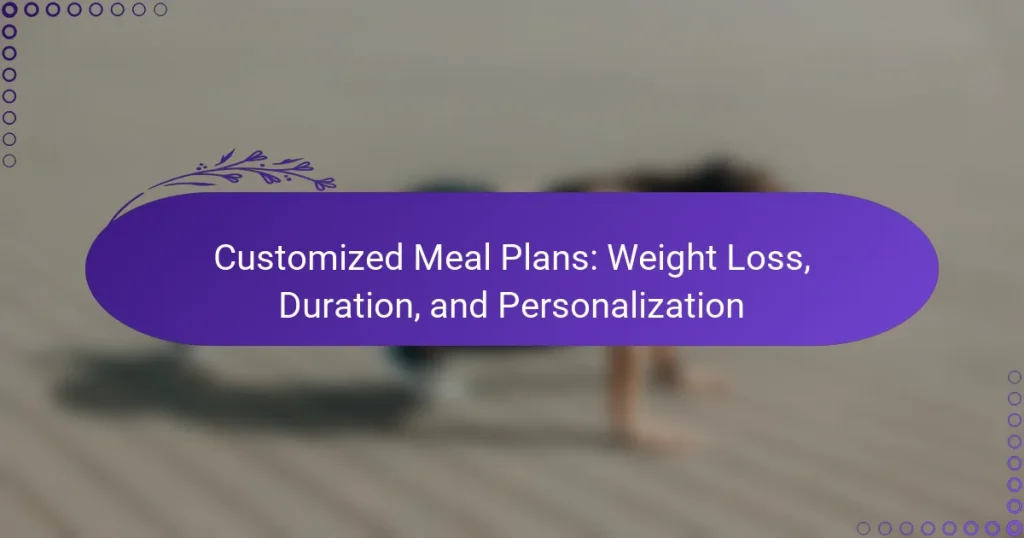Customized meal plans for weight loss are designed to meet individual dietary needs and preferences, ensuring a balanced approach to nutrition and calorie control. By focusing on personalization, these plans promote sustainable eating habits that can lead to noticeable results within just a few weeks. Tailoring a meal plan to fit one’s lifestyle not only enhances effectiveness but also makes the journey towards weight loss enjoyable.

What are the best customized meal plans for weight loss?
The best customized meal plans for weight loss are tailored to individual dietary needs, preferences, and goals. These plans typically focus on balanced nutrition, calorie control, and sustainable eating habits to promote effective weight loss.
Personalized Nutrition Plans
Personalized nutrition plans are designed based on an individual’s unique health profile, including age, gender, activity level, and dietary preferences. These plans often involve consultations with nutritionists who assess your needs and create a tailored approach that aligns with your weight loss goals.
When considering a personalized plan, look for services that offer flexibility in food choices and adaptability as your preferences or goals change. This ensures long-term adherence and success in weight management.
Calorie-Controlled Meal Plans
Calorie-controlled meal plans focus on reducing daily caloric intake to facilitate weight loss. These plans typically set a specific calorie limit, often ranging from 1,200 to 1,800 calories per day, depending on individual factors.
To effectively implement a calorie-controlled plan, track your food intake using apps or journals, and prioritize nutrient-dense foods that keep you full. Avoid extreme calorie restrictions, as they can lead to nutritional deficiencies and unsustainable habits.
Macro-Based Meal Plans
Macro-based meal plans emphasize the balance of macronutrients: carbohydrates, proteins, and fats. These plans often set specific ratios, such as 40% carbs, 30% protein, and 30% fat, tailored to support weight loss while maintaining energy levels.
When following a macro-based plan, consider using food scales and tracking apps to ensure accurate measurement of your intake. Adjust your macros based on your progress and how your body responds to the diet.
Meal Prep Services
Meal prep services provide pre-portioned ingredients and recipes or fully prepared meals, making it easier to stick to a weight loss plan. These services often cater to specific dietary needs, such as low-carb or vegan options.
When choosing a meal prep service, evaluate the quality of ingredients, variety of meals, and pricing. Look for options that allow customization to fit your taste preferences and nutritional goals.
Online Meal Plan Generators
Online meal plan generators create customized meal plans based on your dietary preferences, caloric needs, and weight loss goals. These tools often allow users to input their preferences and receive a week’s worth of meals and shopping lists.
To maximize the benefits of online meal plan generators, select one that offers flexibility and a variety of recipes. Regularly update your preferences to keep the meal plans exciting and aligned with your evolving tastes.

How long does it take to see weight loss results?
Weight loss results can typically be seen within a few weeks, depending on individual factors such as diet, exercise, and metabolism. Most people start noticing changes in their body composition and energy levels within the first couple of weeks of following a customized meal plan.
Initial Results in 1-2 Weeks
In the first 1-2 weeks, individuals may experience initial weight loss primarily due to water loss and reduced calorie intake. This phase often includes a drop in bloating and an increase in energy levels as the body adjusts to healthier eating habits.
To maximize initial results, focus on hydration and balanced meals that include lean proteins, whole grains, and plenty of vegetables. Avoiding processed foods and added sugars can also help kickstart your weight loss journey.
Significant Changes in 4-6 Weeks
After 4-6 weeks, more significant changes in body weight and composition typically occur as the body begins to burn fat more effectively. During this period, individuals may notice a decrease in body measurements and improved physical performance.
To sustain momentum, it’s essential to maintain a consistent meal plan and incorporate regular physical activity. Setting realistic goals, such as losing 0.5 to 1 kg per week, can help keep motivation high and ensure steady progress.
Long-Term Maintenance Strategies
Long-term weight maintenance requires ongoing commitment to healthy eating and lifestyle choices. After reaching weight loss goals, it’s crucial to establish a balanced diet that can be sustained over time to prevent regaining lost weight.
Consider implementing strategies such as meal prepping, tracking food intake, and scheduling regular physical activity. Engaging in support groups or working with a nutritionist can also provide accountability and guidance for maintaining your results.

How to personalize a meal plan effectively?
Personalizing a meal plan involves tailoring it to fit individual dietary preferences, nutritional needs, and lifestyle factors. This approach ensures that the meal plan is not only effective for weight loss but also sustainable and enjoyable.
Assessing Dietary Preferences
Understanding dietary preferences is crucial for creating a meal plan that aligns with personal tastes and restrictions. Consider factors such as vegetarianism, veganism, gluten intolerance, or food allergies when designing your plan.
To assess preferences, you can create a list of foods you enjoy and those you dislike. This will help in selecting meals that are both satisfying and compliant with your dietary needs.
Understanding Nutritional Needs
Nutritional needs vary based on age, gender, activity level, and health goals. A balanced meal plan should include appropriate portions of macronutrients: carbohydrates, proteins, and fats, as well as essential vitamins and minerals.
Consulting with a registered dietitian can provide personalized insights into your specific nutritional requirements. They can help you determine calorie intake and the right balance of nutrients to support weight loss effectively.
Incorporating Lifestyle Factors
Incorporating lifestyle factors is essential for maintaining a meal plan. Consider your daily schedule, cooking skills, and access to ingredients when planning meals. For instance, if you have a busy work schedule, opt for quick and easy recipes that require minimal preparation.
Additionally, think about your eating habits and social situations. If you frequently dine out, learn how to make healthier choices at restaurants to stay on track with your meal plan.

What are the key components of a successful meal plan?
A successful meal plan includes balanced macronutrient distribution, whole food ingredients, and adequate hydration along with healthy snack options. These components work together to support weight loss while ensuring nutritional needs are met.
Balanced Macronutrient Distribution
Balanced macronutrient distribution involves a proper ratio of carbohydrates, proteins, and fats in your meals. A common guideline is to aim for approximately 40-50% of your daily calories from carbohydrates, 25-35% from fats, and 20-30% from proteins.
Adjust these ratios based on individual goals, activity levels, and dietary preferences. For instance, someone focused on muscle gain may increase protein intake, while someone looking to lose weight might reduce carbohydrates.
Inclusion of Whole Foods
Whole foods are minimally processed items that retain their natural nutrients. Incorporating fruits, vegetables, whole grains, lean proteins, and healthy fats into your meal plan can enhance its effectiveness and nutritional value.
Consider creating meals that feature a variety of colors and textures, which can help ensure a broad spectrum of vitamins and minerals. For example, a meal could include grilled chicken, quinoa, steamed broccoli, and a side salad with mixed greens.
Hydration and Snack Options
Staying hydrated is crucial for overall health and can aid in weight loss. Aim for at least 2-3 liters of water daily, adjusting based on activity level and climate. Herbal teas and infused water can also contribute to hydration.
Healthy snack options should be included in your meal plan to prevent overeating at main meals. Consider snacks like Greek yogurt, nuts, or fresh fruit, which provide nutrients without excessive calories. Avoid processed snacks high in sugar and unhealthy fats.

What are the common pitfalls in meal planning?
Common pitfalls in meal planning can derail weight loss efforts and lead to frustration. Recognizing these issues early can help create a more effective and enjoyable meal plan.
Overly Restrictive Diets
Overly restrictive diets often lead to feelings of deprivation, making it difficult to stick to a meal plan. When individuals eliminate entire food groups or drastically cut calories, they may experience cravings and binge eating, which can counteract weight loss goals.
Instead of extreme restrictions, aim for a balanced approach that includes a variety of foods. For example, consider a plan that allows for occasional treats while focusing on whole foods like fruits, vegetables, lean proteins, and whole grains.
Lack of Variety
A lack of variety in meal planning can lead to boredom and decreased motivation. Eating the same meals repeatedly can make it challenging to adhere to a meal plan, as it may not satisfy nutritional needs or personal preferences.
To combat this, incorporate a range of ingredients and cooking methods. Experiment with different cuisines and seasonal produce to keep meals exciting. For instance, try rotating between different protein sources like chicken, fish, and legumes throughout the week.


